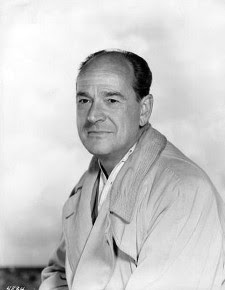 |
| Anthony Mann |
The Daves film was ironically seen as the landmark Western to deal sympathetically with Native Americans. Just as ironic, the Mann film did not receive the kudos in spite of the fact that he had made a tougher and more authentic film. Mann's overall career, however, did end in a blaze of glory with epics of mythic grandeur and deep formal beauty in El Cid (1961) and the first half of The Fall of the Roman Empire (1964).
The Man from Laramie (1955) further demonstrated
his pre-eminence in the genre. This ambitious western concerns a corrupt
landowning family who finally disintegrate when an outsider, (James Stewart in
his best role for Mann), is drawn into its closed world. Mann's dramatic
presentation, partly set in striking New Mexico locations, is, as in most of
his 1950s Westerns, Shakespearian in its power and intensity.
Mann's widescreen compositions of the 1950s are among the best
uses of that then fresh format when many film makers were still exploring its
possibilities. The process enabled Mann to realize its superbly configured
canvas in which the conflicts are grandly played out. Donald Crisp plays family
patriarch, Alec Waggoman going blind (in more than just a physical sense) who
is preoccupied with dynastic succession. His natural son (Alex Nicol) is a
vicious psychopath who, early in the film, overturns and brutally burns
Stewart's trading wagons, shoots his mules and has him roped and dragged
through the dirt, all in a pitiful bid to assert his authority in front of his
men. In a later incident, he shoots Stewart's hand at point blank range, as if
castrating him (a violent and shockingly potent sequence).
Crisp's foreman and surrogate son (Arthur Kennedy in a fine
performance) feigns worthiness but plots to usurp the succession and betray his
father-surrogate. Stewart as catalyst and protagonist, fulfils his own quest
for justice and revenge with an obsession/pathology bordering on madness.
Strong stuff!
Director Mann's compositions for the frame always tended towards
classic simplicity and uncluttered spareness, even in epic forms like El Cid. In Man of the West, they are pared back to the bone, mostly to a
single claustrophobic interior set and a journey through a barren desert
landscape into a ghost town (ironically called "Lassoo"). Gary
Cooper, in one of his most expressively laconic late performances, plays Link
Jones, a former outlaw long gone straight and respectable, who through an
unhappy chain of circumstances falls afoul of his old gang, presided over by
ranting father/mentor figure Lee J Cobb, in a grandly theatrical role
tailor-made for his volcanic outbursts.
The most extreme of Mann's exploration of dysfunctional families
and betrayed friendships, Man of the West
encompasses sexual and physical humiliation (there are two remarkably nasty
parallel scenes involving, respectively, Julie London and Jack Lord, and Gary
Cooper and Jack Lord), as well as madness and fratricide. Gary Cooper functions
very differently from James Stewart in their respective westerns for Mann: while
Stewart's demons are generally unleashed from within or through a contemplation
of his alter ego in another strong protagonist (Bend of the River, The Naked Spur, The Man from Laramie), Cooper's
are re-imposed from without (the accidental meeting up with his old partners in
crime).
The film ends in tragedy: Cobb's death at the hands of his
erstwhile "son" Cooper is staged with a grandeur that is consistent
with Mann's proposal to film a western version of King Lear with John Wayne, a
project sadly interrupted by Mann's sudden death. This is one of the great
westerns.
El Cid is Hollywood's greatest epic
film by a long margin. Epics were fashionable between 1953 and 1963. They aimed,
through their spectacle and technology, at getting bums back into cinema seats
after the damage TV had done to business. Anthony Mann's 1950s westerns with
James Stewart were, as alluded to above, among the mythical, psychological and
visual highpoints of that most mythical of genres. All Mann's virtues as a
director of Westerns have been transferred to this lofty tale of medieval
Spain. Charlton Heston was probably the only actor of his time with the
authority and physical grace to carry with complete conviction and credibility
a role of such heroic weight - this is far and away his best screen
performance.
Mann's imagery resonates through its clean, classical lines and
stately compositions (and its precise control of colour - greys, whites,
blacks, and browns mostly, with outbursts of reds). Miklos Rosza's intelligent
score, based on medieval Spanish themes, lends the appropriate gravitas to
complement Mann's visual imagination. Philip Yordan's necessarily stylised
screenplay conveys the film's thoughtful mix of action and reflection. Sophia
Loren is exquisitely lovely as the complex Chimene. And only Heston could have
carried off the thrilling and uplifting finale where as a corpse strapped to
his horse, he stirringly rides into legend-and the glory accorded to all mythic
heroes.
In summation, Anthony Mann is one of the purest classicists in
American cinema exploiting Greek models and Shakespeare in both visual and
dramatic senses. His best films from The
Furies (1950) to El Cid make my
blood race with their cleanness and precision both stylistically and
thematically. The James Stewart westerns and Man of the West are among the finest exemplars but the power and
visual cleanness of all his work after 1950, even in relatively minor works
like The Tin Star (1957) and The Last Frontier (1955), leave me
gobsmacked.
Editor's Note: Noel
Bjorndahl’s previous personal histories have included
 |
| Walter Huston, Barbara Stanwyck, The Furies |
Click on
the link to take you to the post



No comments:
Post a Comment
Note: only a member of this blog may post a comment.